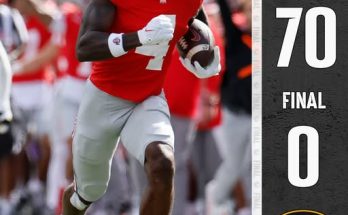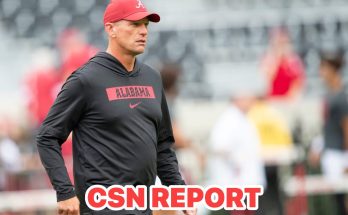Head coach Rick Barnes has officially named Scott Daughtry as the director of strategy for the Tennessee men’s basketball program, a move that reflects the continued evolution of a program rooted in tradition but thriving through innovation. Daughtry, a familiar face within the Volunteers’ program, brings both deep institutional knowledge and a forward-thinking basketball mind to the new role. With a resume that spans over four years in various positions within the program — including time as a head manager and graduate assistant — Daughtry now steps into a pivotal leadership role, charged with helping guide Tennessee through the ever-changing landscape of college basketball.
In many ways, the announcement marks the natural next step in Daughtry’s journey. Since first joining the program, he has quietly earned the trust and respect of the coaching staff, players, and support personnel. His contributions have never been loud or flashy, but they’ve been consistent and invaluable — the kind of behind-the-scenes work that helps a program elevate from good to great. By promoting Daughtry to director of strategy, Barnes is not just rewarding loyalty and work ethic; he’s embracing a modern basketball mind who understands the fusion of analytics, film study, and tactical innovation required to compete at the highest level of college basketball.
Barnes, now one of the most respected coaches in the country, has always been mindful of surrounding himself with staff who bring complementary strengths. And in Daughtry, he has found a trusted confidant and a rising star who combines a deep understanding of Tennessee’s culture with a fresh analytical approach to the game. While titles like “director of strategy” are relatively new within the sport, their significance cannot be overstated. College basketball is in the midst of a data revolution, and programs that fail to adapt risk being left behind. Whether it’s tracking shot quality, optimizing rotations, or scouting opponents through advanced metrics, the modern game demands a nuanced understanding of numbers and trends. Daughtry’s promotion signals Barnes’ intention to keep Tennessee at the forefront of that movement.
Scott Daughtry’s journey is a testament to persistence and a deep love for the game. As a head manager, he was responsible for much of the logistical work that keeps a team running — organizing practice, helping with travel, assisting in drills, and supporting the coaching staff in myriad ways. It’s a role that requires humility, organization, and a relentless attention to detail. But even in that capacity, Daughtry’s basketball mind was evident. Coaches began to notice the questions he asked during film sessions, the insights he offered about defensive schemes or lineup adjustments, and the way he consistently thought one step ahead. His transition to graduate assistant allowed him to further flex those muscles, helping with player development while expanding his role in scouting and analytics.
Tennessee’s recent success under Rick Barnes — including consistent NCAA Tournament appearances and high national rankings — has been driven in part by the strategic excellence of the coaching staff. Daughtry has played a quiet but essential role in that evolution. As a GA, he often worked closely with assistant coaches during film breakdowns, offering key statistical takeaways and helping to craft scouting reports that balanced traditional observations with advanced data. Players came to appreciate the clarity and purpose behind his work. In a sport where preparation can be the difference between a win and a loss, Daughtry’s fingerprints have been on many of Tennessee’s biggest victories.
Now, as director of strategy, his influence will only grow. The responsibilities of the role are wide-ranging and critically important. At the core, Daughtry will be tasked with helping define how Tennessee approaches the game — from practice planning to game-day adjustments. He will be integral in crafting scouting reports that incorporate data visualization and predictive modeling, aiding the coaching staff in understanding opponents’ tendencies, weak points, and preferred matchups. Additionally, he’ll likely be involved in Tennessee’s own self-scouting processes, helping the Vols identify internal trends that can be used to enhance performance over the course of a long season.
This isn’t just about stats or film; it’s about creating a competitive edge in a sport where margins are razor-thin. In today’s college basketball landscape, the line between a Sweet Sixteen and a second-round exit can come down to a single possession — a missed box-out, a mismatched defender, a late rotation. Coaches increasingly rely on minds like Daughtry’s to flag those details before they become problems, and to help identify in-game opportunities that can be exploited for success.
What makes Daughtry so uniquely suited for this role is his holistic understanding of the program. Having been embedded within Tennessee basketball for over four years, he understands the culture, the expectations, and the relationships that drive the team forward. He’s not coming in from the outside trying to impose a system; he’s growing into a role he has already helped shape. That continuity will be invaluable. Daughtry knows how Barnes likes to run practice, what types of analytics resonate with each assistant coach, and how to communicate complex ideas in a way that connects with players.
His new title also reflects a broader trend across college athletics, where programs are increasingly mirroring the structure of NBA front offices. Positions like “director of strategy,” “director of player development,” and “chief of staff” are becoming more common, helping divide responsibilities and focus expertise in areas that were once treated as afterthoughts. With this move, Tennessee is again proving it is committed to not just playing at an elite level, but operating like an elite program across every dimension.
Daughtry’s appointment also sends a clear message to others working their way up the ladder within college basketball: if you invest in the program, if you bring value, if you think the game deeply and commit to doing the work every day, the opportunity will come. Barnes has long been known for loyalty and mentorship — many of his former assistants have gone on to become head coaches — and Daughtry may very well be on that path someday. For now, though, his focus will be on helping Tennessee navigate the present while building toward the future.
This offseason has already featured significant roster movement across college basketball, and Tennessee is no exception. Amid the chaos of the transfer portal and NIL negotiations, having a steady presence like Daughtry’s behind the scenes becomes even more important. He offers continuity, clarity, and strategic insight at a time when programs must balance development, retention, and recruitment — often all at once. His ability to parse through data and offer clear takeaways will allow the coaching staff to make more informed decisions in all aspects of program management.
There is no denying the challenges that lie ahead for Tennessee. The SEC is as competitive as ever, and the Vols will once again face one of the most demanding schedules in the nation. But they do so with a staff that is better prepared than ever to meet the moment. Scott Daughtry’s promotion is a part of that preparation — a move that may not generate headlines nationally, but one that those within the sport will recognize as smart, strategic, and potentially game-changing.
Rick Barnes has made a career out of identifying talent, not just on the court, but on his bench and behind the scenes. In naming Daughtry the director of strategy, he’s betting on a young mind with a rare combination of intellect, passion, and humility. It’s a bet that seems likely to pay off.



